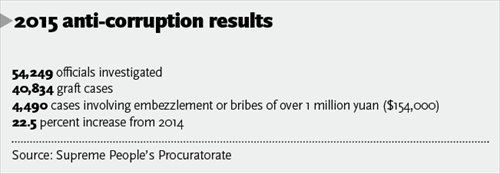China vows no let-up in drive against graft
4,490 cases involved officials embezzling more than 1 million yuan

China on Sunday vowed to continue to place "great pressure" on corruption, as analysts hailed the initial achievements of the anti-graft campaign but warned of a "grim" situation for the campaign's future.
Twenty-two former officials at the ministerial level or above, including former security chief Zhou Yongkang were prosecuted in 2015, Procurator-General Cao Jianming said in the work report of the Supreme People's Procuratorate (SPP) to the National People's Congress (NPC) and the National Committee of the Chinese People's Political Consultative Conference (CPPCC).
Chinese courts completed the trials of Zhou and 14 other senior officials in 2015, said Chief Justice Zhou Qiang in the work report of the Supreme People's Court (SPC). "We will continue to maintain high pressure on corruption," Zhou said.
The SPP report saw a slight drop in the number of officials investigated. A total of 54,249 officials were investigated in 40,834 graft cases in 2015 compared to more than 55,000 and 41,000, respectively, in 2014.
Zhang Xixian, a professor from the Party School of the Communist Party of China Central Committee, told the Global Times that the drop indicated an initial achievement made since 2012 when China launched its anti-corruption campaign.
Meanwhile, 4,490 cases involved officials who allegedly embezzled or accepted bribes of over 1 million yuan ($154,000), up 22.5 percent from 2014. Of those investigated, over 4,500 were officials at the county level or above, a 13 percent increase from 2014, it added.
"The figures show how corrupt officials have caused a greater harm to society, as the number of money involved in those cases is mounting. This is another sign of the grim situation the country is in, and that we cannot relax on the campaign," Zhuang Deshui, deputy director of the Research Center for Government Integrity-Building at Peking University told the Global Times.
According to the SPP report, some 41 former senior officials faced formal investigations, up from 28 in 2014. Among them were former top political advisor Ling Jihua and Yang Dongliang, former director of the State Administration of Work Safety.
Zhuang said Ling's case could be similar to Zhou Yongkang's case, which took about a year before going to trial, but it may also hinge on the case of Ling's brother, Ling Wancheng, who is reportedly hiding in the US.
"Repatriating Ling Wancheng can help speed up the investigation, and may affect his future trial," Zhuang said, noting that Ling Wancheng may be holding evidence against his brother.
It usually takes a longer time before trials of officials being investigated can begin, since the investigation may involve a lot of evidence and people. "A fair and flawless judgment is more important than a quick trial to help enhance government credibility," said Zhuang.
Legislation is key in China's effort to fight corruption, and laws and regulations should be fully utilized for the restriction of and scrutiny over administrative power, President Xi Jinping has repeatedly said.
Online crimes
In 2015, China completed 6,221 cybercrime cases, the SPC report said, adding that a crackdown has begun on cybercrimes such as rumor-mongering, online-based gambling and spreading pornography in a bid to clean up the online environment.
It also battled online crimes involving the hacking of private information to better protect people's privacy.
The SPP report also said it joined the fight against emerging types of crimes, especially those conducted through telecommunications and the Internet.
Meanwhile, SPC data shows crimes of corruption and dereliction of duty accounted for less than 2.2 percent of all criminal cases completed.
While media reports tend to focus on corruption cases, the report said new or emerging crimes are on the rise in China, like cybercrimes, and many criminal cases can directly affect the public, which require equal attention from the media and judicial authorities.
State security cases
Judicial authorities also pledged to crack down on threats to State security, including terrorism, secessionism and religious extremism.
In 2015, 1,419 criminals were convicted for harming State security, including 1,084 cases involving those who took part in terrorist attacks and secessionist activities, the SPC report said.
Terrorism in China is "under control" but remains under the influence of international terrorist activities, Liu Yuejin, counter-terrorism commissioner of the Ministry of Public Security, said in February.
Xinhua contributed to this story
Read more in Special Coverage: